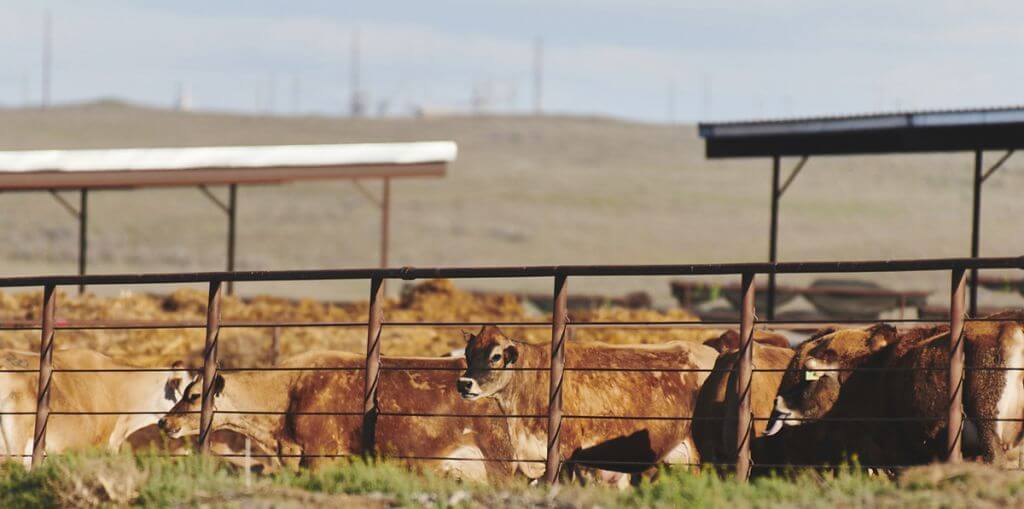By Kendra Chamberlain | July 13, 2023 | Columbia Insight
Under a new law, dairy and confined cattle operations in Oregon will no longer have unlimited access to water.
Large livestock operations will face stricter water rules in Oregon under a bill passed by state lawmakers earlier this year, in the wake of controversies surrounding the now shuttered mega-dairy Lost Valley Farms.
Oregon Senate Bill 85 aims to impose tighter water regulations for new Confined Animal Feeding Operations (CAFOs), a term that’s usually applied to meat, dairy and egg farms.
Under the bill, new and expanding CAFOs will no longer have unlimited access to water to support their livestock operations and will need to submit detailed water supply plans to regulators as part of their permit applications.
New CAFOs will also need to secure appropriate water rights to support their operations.
The bill is currently awaiting the signature of Gov. Tina Kotek. She is expected to sign the bill into law.
State Sen. Jeff Golden (D—Ashland) said drought was one of the primary drivers of the bill.
“It’s bad. It’s very likely going to get worse,” Golden told lawmakers during a Senate Rules Committee meeting in April. “Farmers in many of our districts are losing their yearly crops and, in some cases, their farming business altogether. We have wells going dry, we have more and more ag operators getting cut off by their irrigation districts.”
“When a farmer dealing with that learns that Oregon has a sector of very large livestock operators that get to pump literally unlimited amounts of groundwater, and asks me why — I don’t quite know what to answer.”
Under the current law, CAFOs are able to use unlimited amounts of water to give to livestock as part of a “stockwater exemption.”
That’s a privilege no other agriculture sector is afforded in the state, said state Sen. Michael Dembrow (D—Portland) during the April Senate Rules Committee meeting.
“Those requirements really were generated at an earlier time when we weren’t as concerned about the state of our groundwater,” said Dembrow.
Legacy of Lost Valley Farms Debacle
Under the new law, the stockwater exemption will be capped at 12,000 gallons of water per day for new or expanding CAFOs. Those entities will be required to outline to state regulators where they plan to source the rest of the water needed to run their operations.
Existing CAFOs will be grandfathered in under the stockwater exemption but will need to file water supply plans over the next year when renewing their existing permits.
The stockwater exemption rules are set to sunset in September 2027.
“We know that there are going to be a lot of conversations going on around water over the next few years,” Golden said, referencing the sunset. “So it makes sense to both leave space for that conversation, but also bring some exigency [to that conversation].”
The bill also requires new and expanding CAFOs to follow stricter rules around how they dispose of wastewater.
“It’s really designed from the lessons that we learned after the Lost Valley [Farms] experience in 2017-2018,” Dembrow told lawmakers during the Senate Rules Committee meeting.
Lost Valley Farms was a 30,000-cow dairy operation that opened in 2017. In just a year and a half, the operation faced nearly $200,000 in penalties from the Oregon Department of Agriculture for violations related to waste mismanagement.
“They started operating before they had secured adequate water rights. The infrastructure that they built was inadequate to prevent contamination to the aquifer,” said Dembrow.
Under the new law, state regulators will no longer issue certain water quality permits to new CAFOs in groundwater management areas, nor will regulators issue permits to new CAFOs located within half a mile of fish-bearing streams.
The bill’s trajectory through the state legislature reflects steep opposition voiced from the agriculture sector.
SB 85 is the evolution of earlier legislative attempts to place a moratorium on new CAFOs in the state.
After three days of public hearings held on proposed moratoriums earlier in the legislative session, lawmakers worked with the agriculture sector on SB 85 as a compromise.
“I’ve had more meetings than I think I can count with key stakeholders and our regulatory agencies . . . and the governor’s office to decide what the most constructive path through this challenge would be,” Golden told lawmakers in April.
“We decided that a moratorium was not that path. This is a tough issue to solve now, and there’s no good reason to think it’d be much easier after a moratorium.”
Given current trends, those meetings and decisions are only going to get tougher. SB 85 could well represent just the first step in a complete reassessment of water allocation policies across the state and Columbia River Basin.
This article first appeared on the Columbia Insight website on July 13, 2022.

